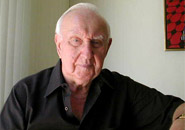Eclectic in their programming and superlatively talented, the Locrian Chamber Players have a unique mandate: they are the only new music ensemble which limits their repertoire to works composed in the last decade. This has led them to give countless American and World premieres of works. LCP are giving a concert this Thursday at Riverside Church, uptown in NYC. I caught up with the group’s director, David Macdonald, who whets my appetite for what looks to be an exciting concert.
CBC: How did you come to commission Malcolm Goldstein’s The Sky has Many Stories to Tell?
 DM: A long time ago I heard Malcolm play a solo violin improvisation at Carnegie Hall. I was floored by the sounds he got out of the instrument and the way he built a flowing piece on the spot out of all these extended techniques. I later found a string quartet by him, which we performed in 2008, I think. We loved the piece and, I’m happy to say, he was pleased with the performance. We got to talking about having him write a piece for Locrian and “The Sky…” is the result of that. The commission came through the Canada Council. (Malcolm lives in Montreal.) The piece, like most of his works, is a set of coordinated improvisations.
DM: A long time ago I heard Malcolm play a solo violin improvisation at Carnegie Hall. I was floored by the sounds he got out of the instrument and the way he built a flowing piece on the spot out of all these extended techniques. I later found a string quartet by him, which we performed in 2008, I think. We loved the piece and, I’m happy to say, he was pleased with the performance. We got to talking about having him write a piece for Locrian and “The Sky…” is the result of that. The commission came through the Canada Council. (Malcolm lives in Montreal.) The piece, like most of his works, is a set of coordinated improvisations.
Who performs your Hornpipe? Is this a new piece?
It’s for string quartet, and it is a new piece. Anyone who wants to hear it should not come late. It lasts about 3 minutes and it’s first on the program.
Tell me about Evan Hause and his piece Halcyon Shores?
Evan is probably best known for a series of operas he’s written over the past decade based on 20th century historical subjects. Like many of today’s youngish composers, his influences are very eclectic. One of those operas has this aria where the vocal writing is kind of a hybrid of sprechtstimme and scat singing. It’s really terrific. Halcyon Shores is for violin, cello, flute and harp. It’s never been performed in New York.
John Adams’ music is, of course, well known and often performed, but Fellow Traveler perhaps isn’t one of his ‘household name pieces.’ What’s Adams up to here?
It’s a crazy little piece he wrote for the Kronos Quartet a few years ago. It’s almost entirely quarters and eighths at a very fast tempo (half-note-equals-138), with lots of nervous syncopation.
Which composers are going to be in attendance on Thursday?
Me and Evan Hause. Malcolm was supposed to be there and to play the violin part in his own piece. But he became ill last week after a grueling European tour and thought it best not to push himself. Our excellent violinist Cal Wiersma will take his place.
This has been a year of transition for Locrian Chamber Players? How have things changed in the way that you’re organizing the ensemble and programming concerts?
It’s been a tough year. When (co-founder) John Kreckler died, I wasn’t sure if we could continue. But the players have been absolutely lovely in helping me run things. Locrian is a very important part of all of our musical lives, and we will go on.
What plans are in the offing for Locrian?
Next concert: August 26.
……………………………………………..
The Locrian Chamber Players this Thursday, June 10 at 8PM in Riverside Church (10th floor performance space). Entrance at 91 Claremont Avenue (North of W. 120th Street: One block W. of Broadway) Free admission. A reception will follow the concert.
The Program: Malcolm Goldstein – The Sky Has Many Stories to Tell (World Premiere); John Adams – Fellow Traveler; Evan Hause – Halcyon Shores (New York Premiere); Joel Hoffman – Blue and Yellow; Chen Yi – Night Thoughts; David Macdonald – Hornpipe
The Players: Calvin Wiersma and Conrad Harris, violins; Daniel Panner, viola; Greg Hesselink, cello; Diva Goodfriend-Koven, flute; Jonathan Faiman, piano; Anna Reinersman, harp.
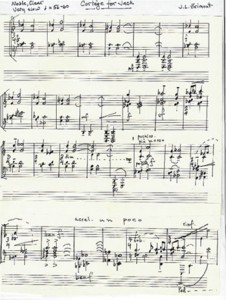
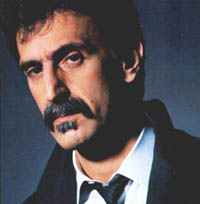
 DM: A long time ago I heard Malcolm play a solo violin improvisation at Carnegie Hall. I was floored by the sounds he got out of the instrument and the way he built a flowing piece on the spot out of all these extended techniques. I later found a string quartet by him, which we performed in 2008, I think. We loved the piece and, I’m happy to say, he was pleased with the performance. We got to talking about having him write a piece for Locrian and “The Sky…” is the result of that. The commission came through the Canada Council. (Malcolm lives in Montreal.) The piece, like most of his works, is a set of coordinated improvisations.
DM: A long time ago I heard Malcolm play a solo violin improvisation at Carnegie Hall. I was floored by the sounds he got out of the instrument and the way he built a flowing piece on the spot out of all these extended techniques. I later found a string quartet by him, which we performed in 2008, I think. We loved the piece and, I’m happy to say, he was pleased with the performance. We got to talking about having him write a piece for Locrian and “The Sky…” is the result of that. The commission came through the Canada Council. (Malcolm lives in Montreal.) The piece, like most of his works, is a set of coordinated improvisations.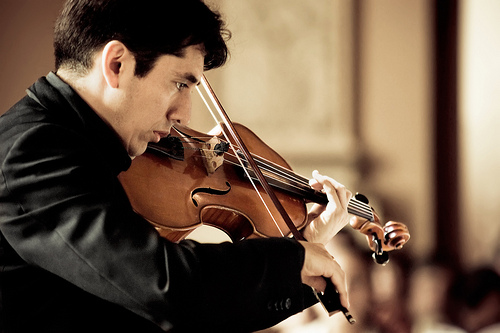
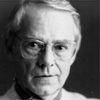 American composer
American composer  2009-2010 marks the sixth year that Houston’s contemporary ensemble and presenting organization
2009-2010 marks the sixth year that Houston’s contemporary ensemble and presenting organization 

